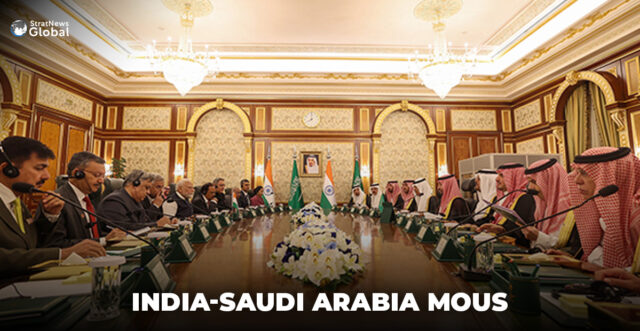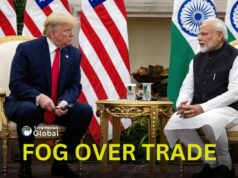India and Saudi Arabia signed multiple Memoranda of Understanding (MoUs) across sectors such as space, health, anti-doping, and postal services during Prime Minister Narendra Modi’s Middle East visit on Tuesday.
“MoU between the Saudi Space Agency and the Department of Space of India on Cooperation in the field of Space Activities for Peaceful Purposes,” read a government statement issued by the Prime Minister’s Office.
Another MoU between the Ministry of Health of Saudi Arabia and the Ministry of Health and Family Welfare of India on Cooperation in the field of Health.
“MoU between the Saudi Arabian Anti-Doping Committee (SAADC) and the National Anti-Doping Agency, India (NADA) on Cooperation in the field of Anti-Doping Education and Prevention,” the statement said.
Modi Meets Crown Prince
During his visit, PM Narendra Modi was received by Prince Mohammed bin Salman, Crown Prince and Prime Minister of the Kingdom of Saudi Arabia, at the Royal Palace in Jeddah and accorded a ceremonial welcome.
Prime Minister Modi and Prince Mohammed bin Salman held official talks and co-chaired the second meeting of the India–Saudi Arabia Strategic Partnership Council (SPC) HRH Crown
The leaders reviewed the progress under the Council since their last meeting in September 2023 in New Delhi.
The leaders noted with appreciation the intensification in bilateral engagement and the large number of high-level visits across various Ministries that have built trust and mutual understanding on both sides.
The two leaders discussed cooperation in the fields of energy, defence, trade, investment, technology, culture and people-to-people relations.
Prime Minister thanked the Crown Prince for the support and welfare extended to the Indian community in Saudi Arabia.
He also appreciated the support provided by the Saudi government for the Indian Haj pilgrims.
High-Level Task Force
Both leaders appreciated the progress in the discussions in the High-Level Task Force on Investment.
“They welcomed the understanding reached by the Task Force in multiple areas, which builds on the earlier commitment of Saudi Arabia to invest USD 100 billion in India across multiple sectors, including energy, petrochemicals, infrastructure, technology, fintech, digital infrastructure, telecommunications, pharmaceuticals, manufacturing, and health,” read a statement issued by the Indian government.
“In this context, they particularly welcomed the agreement to collaborate on establishing two oil refineries in India, as well as the progress achieved on taxation issues,” the statement added.
The Prime Minister proposed that to further strengthen economic ties, both countries could work to connect payment gateways and trade settlement in local currencies.
Economic Corridor
The two leaders discussed progress in India-Middle East Europe Economic Corridor [IMEEC], particularly the bilateral connectivity initiatives being undertaken by the two sides.
Both leaders also exchanged views on regional and global issues of mutual interest.
“The two leaders expressed satisfaction at the outcomes of the work of the two Ministerial Committees under the Council, namely: (a) the Committee on Political, Security, Social and Cultural Cooperation and its subcommittees, and (b) the Committee on Economy and Investments and its Joint Working Groups,” the statement said.
The two leaders welcomed the expansion of the Strategic Partnership Council with the establishment of two new ministerial committees.
In this context, to reflect the deepening of the defence partnership, the leaders agreed on the establishment of the Ministerial Committee on Defence Cooperation.
Acknowledging the growing momentum in cultural cooperation between the two sides in recent years, they also agreed to establish a Ministerial Committee on Tourism and Culture Cooperation. After the meeting, the minutes of the second SPC were signed by the two leaders.
Narendra Modi cut short his Saudi Arabia trip and returned to India following the terror attack in Pahalgam in Jammu and Kashmir, which left 28 people, including Hindu tourists, killed.
(With inputs from IBNS)





